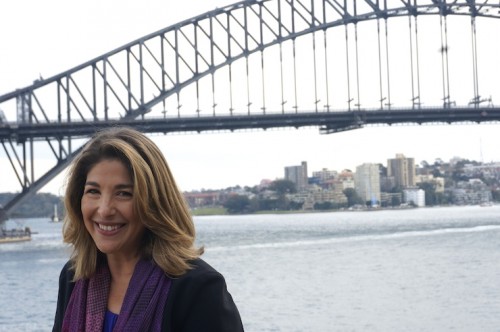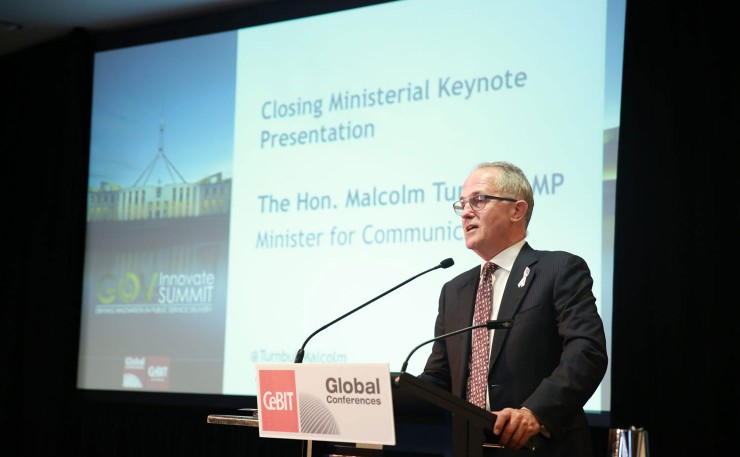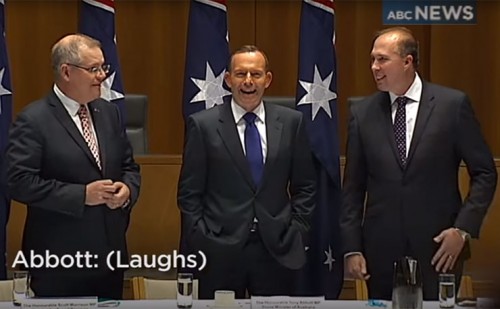The Liberal Party is said to be a broad church. But even under Turnbull it’s not broad enough to come up with an effective response to climate change, writes Thom Mitchell.
Note to readers: we’re trying to send reporter Thom Mitchell to the Paris Climate Talks. To help us, pledge here.
Negotiating teams are returning from UN talks on climate change in Bonn, Germany, this week. It was the last international meeting of governments before a crucial summit in Paris this December where, not to put too fine a point on it, the world will try to nut out a way to stave off ecological disaster.
Scientists say we’re now in the second half of the ‘critical decade’ for stabilising the Earth’s weather systems — the window of time within which we can still take action to avert ‘dangerous’ climate change.
But what 195 governments have accepted as ‘dangerous’ — emissions that would lead to a more than two degree rise in average global temperatures — is a potentially dangerous political construct in itself.
What ‘dangerous’ really means, in scientific terms, looks increasingly like a sanctioned disaster favoured by rich countries in particular. If temperatures rise by two degrees above pre-industrial levels, it’s likely that the world as we know it would be totally and unequivocally in the bin.
To reclaim a mantle disparagingly bestowed on climate scientists by conservative commentators like Andrew Bolt, the trend in the science is forcefully towards more ‘alarming’ forecasts.
In fact, a large group of countries involved in the UN process around climate change, but with less economic and diplomatic power, are actually pleading for an international target of limiting warming to 1.5 degrees. Literally, they’re pleading.
Passions run very high at these high-level talks, as you might expect when some leaders — like President Anote Tong, of Kiribus — are literally organising for the mass evacuation of their low-lying archipelagos. In the case of the many African countries that support a 1.5 degree target, the more likely affect of a 2 degree rise in temperatures is extreme food shortages and widespread hunger.
Recently, just before former Prime Minister Tony Abbott was deposed, the nations of the Pacific Islands Forum repeated their demand that a 1.5 degree target be adopted by the global community in Port Moresby. The day after attending the talks, the Australian Prime Minister’s response was — again, literally — a belly-chuckle.
More than one world leader called that out for being pretty disgusting, and incredibly callous.
The then Prime Minister and Social Services Minister — Tony Abbott, and Scott Morrison — and Immigration Minister Peter Dutton, shared a joke at a press conference. Dutton cracked it, “Time doesn’t mean anything when you’re about to be, you know, have water lapping at your door”.
Abbott, in particular, thought it was a hoot.
One day after oozing platitudes to the elected leaders of neighbouring Pacific countries, Abbott’s worst kept secret, that he really doesn’t give a damn about the mismatch between what coping will cost and the capacity of their economies to pay, was uncomfortably exposed.
It was a clear sign of how little the Australian government understands or cares about, the gravity of the fact we’re physically destroying the atmospheric conditions that allow us to breath, and how quickly we’re doing that.
But it was also a symptom of a deep discord that has so far outmatched the climate change ‘alarmists’ efforts to reign in global emissions: the people who currently run Australia hate regulation, and they love wealth and the wealthy. They make no bones about that.
For want of a better word, they are neoliberals. Admittedly, the Abbott government did bring a new radicalism and nastiness to attempts to drive wealth upwards into the deserving arms of to ‘the wealth creators’ (who happen, quite often, to have serious self-interest in the continuing combustion of fossil fuels).
Climate change, of course, was no exception. The rate of remission in Australia’s efforts to clean up its economy over the past few years is legendary amongst the people who watch these things closely. No doubt it will have spooked some of them, at Bonn, that Australian bureaucrats will have continued arguing for the Abbott-era policy on climate change.
They have been arguing for a policy that would see Australia reduce its emission at an annualised rate of -1.6 per year. As the Climate Institute has shown, that’s about 35 per cent below what comparable nations have agreed to do.
In 2012, the world’s best-known climate scientist and former head of NASA’s Goddard Institute for Space Studies, James Hanson said that if we’d started in 2013 a rate of emissions reduction of six per cent a year would be needed “to restore planetary energy balance and stabilise [the]climate this century”.
“If we wait 10 years, it is 15 per cent per year — extremely difficult and expensive, perhaps impossible. But we aren’t even starting,” he said. Clearly, Australia’s efforts are an expensive insult to such experts’ intelligence.
We used to be seen as a world leader in legislating to effectively to disincentivise carbon emissions, and while we will all have our views on that, of course, the grim reality is we are now perplexing the world by handing money over to polluters and asking them politely not to pollute.
Through a series of ‘reverse auctions’, in which a very small number of companies bid for taxpayer funding to mitigate their carbon emissions, the government will hand out $2.5 billion to big polluters by 2020, and much, much more beyond that. There’s little evidence that this expensive plan — which in contrast to a carbon tax or emissions trading scheme is a drag on revenue, rather than a source of it — will achieve even the trifling cuts our government has committed us to.
For a party with a cultish fervour for the free market, a school that typically hates imposing such inefficiencies on the economy, it’s a bloody weird proposition. Although it’s hard to know for sure it’s most likely reflective of the Liberal Party’s wilful blindness to a problem that threatens their worldview.
Uncomfortably for Australia’s conservative clique, the degradation of our climate and broader environment is systematic, and accelerating, and it demands a systematic response. Of course, that means government intervention. Fossil fuels are the engine of developed economies, which sprang largely from the industrial revolution. We’ve now had 20-odd years to upgrade its exhaust pipe.
During that same time, greenhouse gas emissions have risen by around 60 per cent.
As Canadian writer and activist Naomi Klein and many others have noted, around the same time awareness of climate change began to grow with global emissions, folks like Margaret Thatcher and Ronald Reagan were busy instituting the global rise of neoliberalism.

The Liberal party’s most recent delivery of the neoliberal crypt — deregulation of university fees, free trade agreements, and the deep cuts to social services, for example —was particularly aggressive.
But while the Liberal party may be a ‘broad church’, and one which unfortunately shares a bell tower with Labor, it does have one golden rule of admission: members must love free market fundamentalism, freedom for the wealthy, and they must have an aversion to regulation and government intervention in the economy.
The latest Prime Minister, Malcolm Turnbull is simply the new priest at that unholy alter.
He has already self-sacrificed on it once, and he’s made it clear he won’t be doing that again. As a result, Australian diplomats are still arguing for belly-chuckle-Abbott’s disingenuous response, and eating into the second half of our last decade to take real and impactful action on climate change.
Vested with shared responsibility for nothing less than saving the planet, the Australian government’s response to desperate pleas for legitimate action was a cackle of indifference, and a refusal to intervene and stop approving new coal mines, let alone increase the ambitiousness of the globally agreed warming safeguard.
But in many ways, ultimate responsibility for that falls largely on the voting public, who indulged and even encouraged Tony Abbott’s toxic interventions in Federal politics. The widespread support for Abbott’s carbon tax scare campaign, in the absence of a meaningful replacement, directly led to Australia being the only nation on earth to repeal a price on carbon.
It was a very popular policy, and one that was largely predicated on Abbott’s belief that climate change is “crap”. When Abbott first unleashed that job-destroying, economy-wrecking, power-bill-hiking spectre, it really wasn’t difficult to envisage his other attacks.
His very public lynching of the renewable energy industry, which led to an 88 per cent drop in investment, and Australia sliding from being the fourth most popular place to invest in clean energy to the tenth, hardly came as a surprise.
In the lead up to Paris, there will be global mass marches calling for a sufficiently solid deal. Last year New York saw 310,000 people turn out in support of greater action at an international day of action, in an oft-cited example of the growing understanding and urgency among populations elsewhere.
As Australian politics have tracked steadily to the neoliberal right throughout the ‘critical decade’, we have all as voters been implicated in our increasingly villainous contribution to the climate crisis.
As Naomi Klein has noted, even those of us that are deeply alarmed by climate change are involved in ignoring it. “I denied climate change for longer than I care to admit,” she writes.
“I knew it was happening, sure. Not like Donald Trump and the Tea Partiers going on about how the continued existence of winter proves it’s all a hoax. But I stayed pretty hazy on the details and only skimmed most of the news stories, especially the really scary ones. I told myself the science was too complicated and that the environmentalists were dealing with it. And I continued to behave as if there was nothing wrong with the shiny card in my wallet attesting to my “elite” frequent flyer status.
“A great many of us engage in this kind of climate change denial. We look for a split second and then we look away. Or we look but then turn it into a joke (‘more signs of the Apocalypse!’). Which is another way of looking away.”
The support for demonstrations demanding a global compact, and anything else that makes climate action politically palatable in a way that’ll allow Turnbull to take action without losing his leadership of the Liberal party again, will be an interesting test of whether the Australian people are also laughing nervously as the thermostats climb.
New Matilda is crowd-funding to send Thom Mitchell to the Paris Climate Talks. To help, pledge your support here.
Donate To New Matilda
New Matilda is a small, independent media outlet. We survive through reader contributions, and never losing a lawsuit. If you got something from this article, giving something back helps us to continue speaking truth to power. Every little bit counts.





